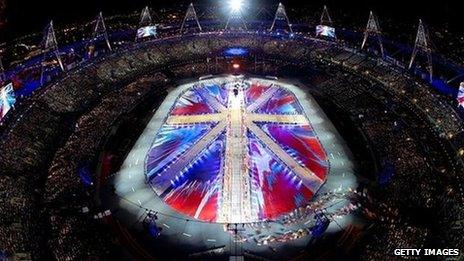BBC World Service poll: Why has the UK gone up in people's estimations?
- Published
- comments

People's opinions of the UK have improved markedly since 2012. That suggestion is based on a BBC World Service survey of more than 26,000 global citizens, whose positive views pushed the UK into third place, behind Germany and Canada.
With ratings of most countries declining this year, why did the UK buck the negative global trend?
There can be little doubt that 2012 was a good year for Brand UK - it hosted the Olympics and there was the Queen's Diamond Jubilee.
London 2012 exceeded everyone's expectations, both on and off the field.
The G4S security debacle just before the Games played into the hands of the doomsayers, but Danny Boyle's eccentric and electric opening ceremony marked the start of a golden summer of sport.
Sam Mountford, director of international polling firm GlobeScan, which conducted the survey, has attributed the UK's improved fortunes to the "Olympics effect".
And Labour MP Tessa Jowell could not agree more.
Dame Tessa, who was the Olympics Minister when London won the bid to host the Games, in 2005, says the sport, settings and Cultural Olympiad demonstrated the "spirit of Britain".
"What the world saw last summer was an open, diverse, self-confident Britain, inviting visitors from around the world to share in our sporting and cultural pride," she said.
"We always talk ourselves down and our media tends to paint Britain as a country where nothing works and nobody can do anything ambitious and big. The Olympics confounded that."
'Restrained types'
However, Peter York says there is more to it than just Olympic fever.
The market researcher and cultural commentator thinks the Olympics, the Diamond Jubilee and the royal wedding of 2011, reminded people about Britain, but its rise in the ratings has more to do with the fall of others.
"To some extent it's because the very big players have fallen down," he says.
"America doesn't seem to have got its mojo back, and people have become disenchanted with the great climbers of the last decade - China and India. People are beginning to realise what lies behind the glossy facade."
In addition to 16 countries, the survey also asked people to decide whether the EU's influence in the world was negative or positive.
Positive views of the EU dropped to their lowest level in 2012 but stabilised this year, and Mr York says the UK has benefited from its "offshore" position.
"We are in it but not of it. Because we are offshore - both physically and metaphorically - we don't get the same downgrade.
"We are put up there with Canada, who survived the financial meltdown of 2008. It is also regarded as a principled country.
"Germany is regarded as an economically strong country with a strong and sensible leader. Canada and Germany are seen to have northern European values and in difficult times, we admire people who are more restrained types."
'Cup-half-full'
The UK was rated positively by about 55% of respondents in 21 countries, climbing from fourth place to third with a four-point increase since 2012.
But not everyone had an positive take on the UK. Greece and Turkey had predominately negative views, while opinion in Pakistan was divided. The most favourable attitudes toward the UK were found in sub-Saharan Africa.
Mr York says Commonwealth countries will generally have a good opinion of the UK but Pakistan sees the UK as an ally of the US.
Dame Tessa says Greece's negative take is probably the result of its financial woes, but both she and Mr York are slightly baffled by Turkey's view.
Graham Hales, UK boss of the global branding agency Interbrand, says the British stereotype has both negative and positive attributes, and history plays a part in people's perception of a country.
He says China, India and the EU had "difficult years", which might have contributed to the UK's boost.
"We were moving forward when other countries were moving backwards," he says.
But he is in no doubt of the Olympic effect.
"The Olympics and the [Diamond] Jubilee provided some great television moments. We were able to get out the photo album showing the best of British," he says.
"Take Bradley Wiggins cycling around Box Hill - the rolling green hills looked fantastic. A lot of it played into the latent perception that people have of the UK - the Royal Family, tradition, pomp and ceremony."
The Games, and particularly Danny's Boyle's contemporary take on Britishness for the opening ceremony, also challenged some people's perceptions, according to Mr Hales.
"Often Britain can be regarded as a solemn, depressing and apathetic place. The Games showed an energetic, exuberant and exciting Britain," he said.
"It is the double-take inside us - we are cup-half-full and cup-half-empty at the same time. You are never sure which one is going to get out of bed."
- Published23 May 2013
- Published14 February 2013
- Published18 December 2012
- Published13 August 2012
- Published11 May 2011